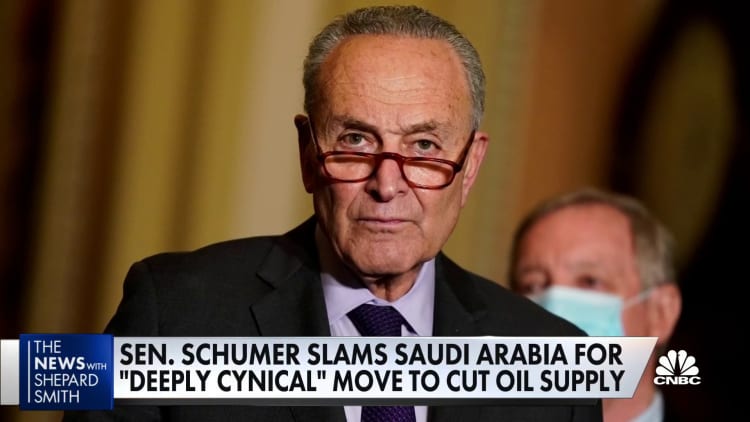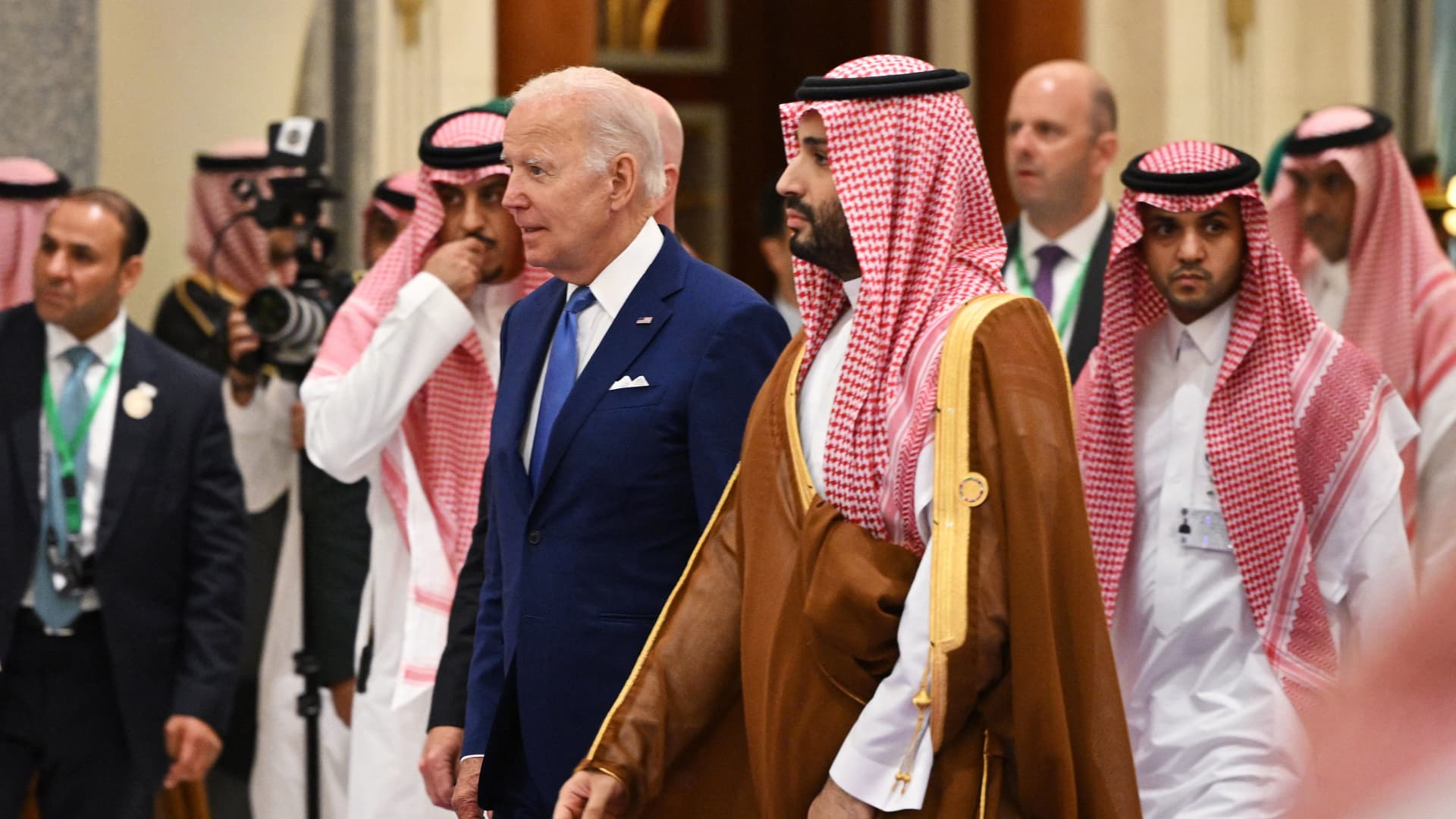
US President Joe Biden and Saudi Crown Prince Mohammed bin Salman arrive for the family photo during the Jeddah Security and Development Summit (GCC+3) at a hotel in Saudi Arabia’s Red Sea coastal city of Jeddah on July 16, 2022.
Mandel Ngan | Afp | Getty Images
President Joe Biden is angry at Saudi Arabia for its decision to slash oil production along with its OPEC allies against U.S. wishes, and he’s made no secret of it.
With the global economy on a knife-edge and energy prices high, Washington sees the kingdom’s move – which it made in coordination with Russia and other oil-producing states – as a snub and a blatant display of siding with Moscow.
The oil producer group in early October announced its largest supply cut since 2020, to the tune of 2 million barrels per day from November, which its members say is designed to spur a recovery in crude prices to counter a potential fall in demand.
For this, Biden said in an interview with CNN on Tuesday that there would be “consequences.” He did not go into further detail as to what those consequences might be.
But what are the Biden administration’s options, and could they backfire?
Weapons and antitrust laws
The Saudi-U.S. relationship was founded, broadly speaking, on the principle of energy for security. Washington has since the 1940s provided billions of dollars in military and security aid to Saudi Arabia. But in recent years, and particularly since the Obama administration began making diplomatic inroads with Iran, Riyadh feels the U.S. commitment to its security has waned.
“The truth is, neither side has been holding up their end of the bargain for nearly 10 years now,” Michael Stephens, an associate fellow at the Royal United Services Institute in London, told CNBC.
“And what you’re seeing, I think, are permanent fractures in the relationship that are based on the fact that neither side really sees as much strategic benefit in the other as they did 20 years ago,” Stephens said, adding that Saudi Arabia’s OPEC oil production cut “is a reflection of that.”
The potential “consequences” Washington can put into action include cutting its military support to the Saudi kingdom, and going after OPEC with U.S. laws.
A file photo of cannisters containing Patriot missiles to intercept missiles fired at Saudi Arabia or its neighboring countries.
Greg Mathieson | Mai | The LIFE Images Collection | Getty Images
Indeed, just one day before Biden’s comments, Sen. Bob Menendez, D-N.J., chairman of the Senate Foreign Relations Committee, demanded that the U.S. immediately halt all cooperation with Saudi Arabia — including weapons sales.
“The United States must immediately freeze all aspects of our cooperation with Saudi Arabia, including any arms sales and security cooperation beyond what is absolutely necessary to defend U.S. personnel and interests,” Menendez said in a statement.
In an earlier interview with CNBC, Sen. Chris Murphy, D-Conn, asked, “What’s the point of looking the other way when the Saudis chop up journalists and repress political speech inside Saudi Arabia if when the chips are down, the Saudis effectively choose the Russians over the U.S.?”
Even Sen. Bernie Sanders, I-Vt., weighed in, demanding in a tweet that, “If Saudi Arabia, one of the worst violators of human rights in the world, wants to partner with Russia to jack up US gas prices, it can get Putin to defend its monarchy. We must pull all US troops out of Saudi Arabia, stop selling them weapons & end its price-fixing oil cartel.”
Beyond withholding military aid, there are legal channels the U.S. government can pursue.
One is the NOPEC bill, which stands for No Oil Producing and Exporting Cartels. This would classify OPEC as a cartel and subject its members to anti-trust legislation.
Something long discussed by lawmakers, the bill is designed to protect U.S. consumers and businesses from artificial oil spikes.
It passed a Senate committee in early May and hasn’t yet been signed into law, but could expose OPEC countries and partners to lawsuits for coordinating supply cuts that raise global crude prices.
The bill would still need to be passed by the full Senate and House and signed into law by the president to go into effect. OPEC ministers have previously criticized the NOPEC bill, warning it would bring greater chaos to energy markets.
Consequences for the U.S. – and for crude prices
The decision by OPEC+ – which constitutes OPEC and its non-OPEC allies like Russia – to cut its output “underscores the extent to which the Biden administration has lost its ability to influence Saudi OPEC+ policy,” said Torbjorn Soltvedt, principal MENA analyst at risk intelligence firm Verisk Maplecroft.
“The White House has few good options despite Biden’s warning of ‘consequences’ after the cut,” he said, noting U.S. lawmakers’ threats of anti-trust legislation and removal of U.S. military assets from Saudi Arabia.
While both courses of action would send a clear message, this could backfire for both the U.S. and for crude prices.
“Both of these options would threaten to break already fraught relations, which in turn would put even greater upward pressure on oil and fuel prices,” Soltvedt said.

“In short, a breakdown in U.S.-Saudi relations would mean a higher Middle East risk premium for the global oil market and higher oil and fuel prices,” he explained. “This is the opposite of what the White House is trying to achieve ahead of midterm elections in November.”
It’s also key to note that the 2 million barrel per day cut will not in fact be as big as that headline figure; several member states have already been far short of their individual production ceilings, and Iraq for instance has indicated it will be producing more than its assigned quota.
Still, many American politicians have long been out of patience with the nature of the U.S.-Saudi relationship, especially as U.S. imports of Saudi oil have shrunk over the years and more than 80% of the Middle East’s crude exports now go to Asia.
This has made a growing number of U.S. lawmakers question, Soltvedt said, “why the American navy should underwrite the security of Middle Eastern oil exports when those barrels are increasingly going East rather than West.”
— CNBC’s Sam Meredith contributed to this report.






